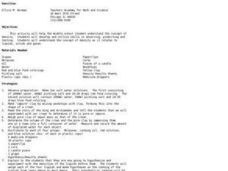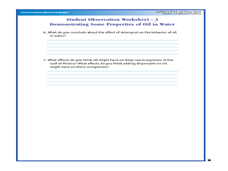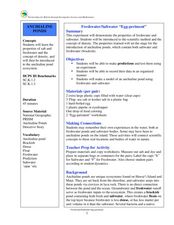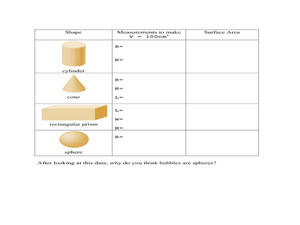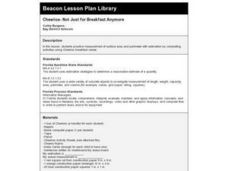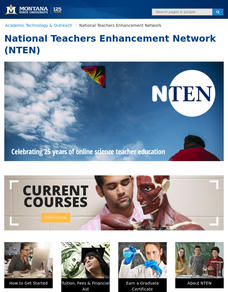Curated OER
Properties of Matter
Students investigate the properties of matter. In this properties of matter lesson, students observe containers of different metals and discuss their properties including density. Students find the density of an unknown metal and of...
Curated OER
Osmosis and Diffusion: Egg Lab
Students examine why diffusion and osmosis happen in an egg cell. In this diffusion activity students demonstrate a semi permeable membrane.
Curated OER
Densities
Young scholars explore the concept of density. In this density lesson plan, students determine the density of a crown and a sample of clay. They hypothesize about the densities of 4 liquids they are given including molasses, cooking oil,...
Curated OER
Sewer Lice
Students observe demonstrations that show adhesion, cohesion, equilibrium density, pressure of gases and solubility. In this gases lesson plan, students observe a demonstration of raisins, spaghetti, and popcorn moving up and down in...
Curated OER
Aqueduct Architecture: Moving Water to the Masses in Ancient Rome
Ninth graders compare ancient and modern technology in water transporting. In this lesson on the evolution of the aqueduct, 9th graders build a working aqueduct model and examine its components. They explain the importance and use of the...
Curated OER
How would an oil spill affect a Marine Sanctuary?
Students explore the concept of environmental stewardship. In this science instructional activity, students discover how scientists assess damages to the environment following oil spills. Students conduct a simulation of a public meeting...
Curated OER
Mini Rockets
Students explore gases. In this chemical energy lesson plan, students will observer chemical reactions and infer a conclusion about reaction producing gasses.
Curated OER
Oil Floats, Right?
Learners examine the properties in oil in water. In this mixture lesson, students read about the Lophelia II 2010: Cold Seeps and Deep Reef Expedition and look at images of deep sea ecosystems. They experiment or participate in...
Curated OER
Freshwater/Saltwater "Eggs-Periment"
Learners explore water properties by conducting a class experiment. In this buoyancy instructional activity, students utilize freshwater, saltwater, plastic cups, hard boiled eggs and food coloring to experiment with the floating...
Curated OER
Why are Bubbles Spheres
Students calculate the surface area of different polygons. In this geometry lesson plan, students practice calculating the volume of spheres. They work with cones, cylinders and rectangular prisms.
Curated OER
Is It There?
Students participate in a instructional activity designed to illustrate these concepts using simple materials. They use Science process skills to observe, measure, predict, make inferences, and communicate while completing the activity....
Curated OER
As a Matter of Fact!
Students explore matter. They use a formula to measure the volume of matter.
Curated OER
Bubbles Everywhere!
Eighth graders use concrete and graphic models to derive formulas for finding perimeter, area, surface area, circumference, and volume of two- and three-dimensional shapes. This lesson is a fun way to practice measurement and circle and...
Curated OER
Perimeter
Learners use their hands, feet, computer, and rulers to measure the perimeter of objects. For this measurement lesson plan, students measure objects around the room and computer generated shapes.
Curated OER
Everybody Needs a Rock
Here is a lesson that rocks! Young scientists choose a rock and list words that describe it. They estimate the mass of their rocks and rank them within a group. They measure their rocks for volume and write a story that somehow includes...
Curated OER
PLANETS IN PROPORTION
Students discover scales for both the solar bodies' relative sizes and their distances from the sun. They find equatorial circumference and volumes of their solar bodies. Students apply estimation strategies and proportioanl reasoning to...
Curated OER
Physical Changes and States of Matter
Fourth graders study evaporation and condensation as parts of the water cycle. First they determine the similarities and differences between a cup of water and an ice cube before measuring the volume of ice before melting it, and...
Curated OER
Figuring Elapsed Time
Students discover the concept of elapsed time. In this calculating time lesson plan, students utilize the Internet to complete record sheets based on the concept of elapsed time. Finally, the students answer questions on their own.
Curated OER
Cheerios- Not Just for Breakfast Anymore
Second graders measure surface area and perimeter using estimation. They complete a variety of measurement activities using Cheerios breakfast cereal.
Curated OER
Cooking a Few of my Favorite Things
Second graders publish a class cookbook of their own recipes. They explore the nutritional value of foods, calculate the measurements, and prepare a healthy recipe for the class.
Curated OER
Demonstrating Erosion in Action
Students easure and record volume of water, then measure and record mass of soil. They explain the effects of the following in controlling erosion: Contouring, cover crop, strip cropping, reforestation, inter-seeding.
Curated OER
Burn, Baby Burn (Or Not)
Physics learners apply the concepts of fluid pressure input and output to firefighting. Divide your class into small groups and give them each a few cards that list nozzle type, hose length, hose size, and structure dimensions, They are...
Curated OER
How Large is a Mole of M&M's
Students calculate whether or not a mole of M&M's fill their high school. They practice factor-labeling, define a mole, and calculate the number of cubic feet per mole of M&M's. To answer the question they measure and calculate...
Curated OER
Area Explorations
Students explore the concept of area. In this area instructional activity, students find the area of irregular shapes with right angles. Students break down each irregular shape into multiple regular shapes in order to find the area. ...


